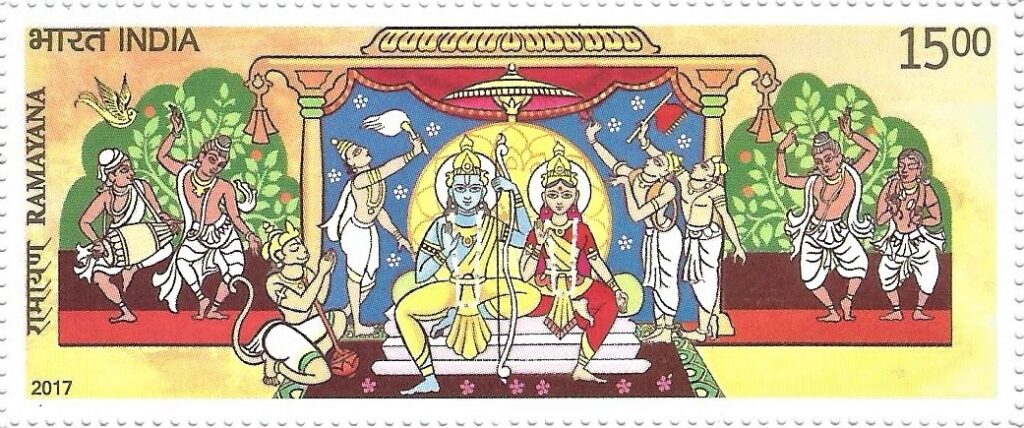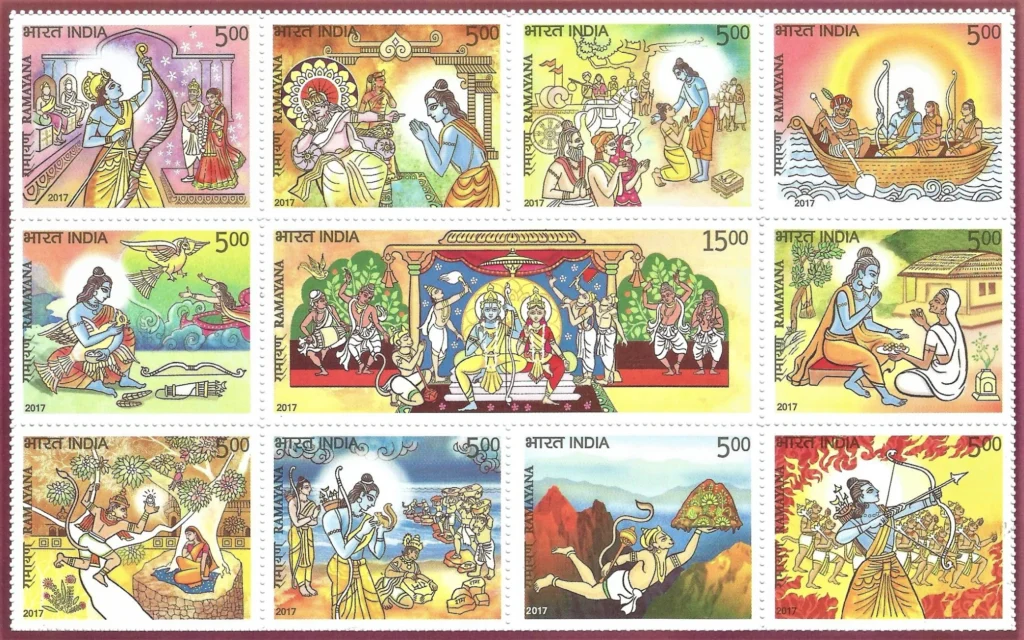
I relate to the different stories and anecdotes, mainly from literary sources in Tamizh and Sanskrit, which are not likely to be that well-known. One of such anecdotes which I have found fascinating is about how we interact with others: how we interpret their actions, speech and gestures transient and habitual, facial expressions, etc. based on our own preoccupations and thought patterns inherent in us. An anecdote from the Ramayana, I hope, will highlight it well.
On returning from Lanka with Sita Devi Sri Rama was coroneted as the king of Ayodhya in a formal way. The ceremony associated with that event is known as “Sri Rama Pattabhishekam”. In most of the houses in South India, the portrait of the pattabhishekam adorns the puja room. In that, Sri Rama with Janaki is seated on the throne with Lakshmana standing and Sri Hanuman on Sri Rama’s right. The following description of what happened during the pattabhishekam needs to be visualised with that picture in the background.
During the ceremony, Lakshmana was observed to be closing his eyes once too often and opening them with a smile that appeared to be almost like a sneer. Sri Rama, Janaki, Sugriva, Vibhishna and Hanuman all noticed it and wondered what it was all about. Each one took it personally and felt that Lakshmana was laughing at them silently reminiscing on one or two aspects of their conduct during the period when Rama left for the forest till his triumphant return.
Rama felt that Lakshmana was thinking “Rama, You are now seen by everybody in your imperial glory. They think that you are invincible and have no weaknesses. If I were to tell them how you cried and were beset with sorrow on finding Janaki missing, they will know that you are not all that mighty and immune to sorrow. If I had not been there to console you, would you have survived.”
Janaki’s mind also reacted along similar lines, “I accused him of coveting me when he tried to reassure me that Rama was in no danger and he would rather not leave me alone when Maricha died calling out ‘He Lakshmna, Janaki!’. Would I be here if he had not risked his life to help Rama to rescue me from Ravana, He is laughing at me”. So thought Sita.
Sugriva and Vibhishna both felt that Lakshmana was gloating over how loyal he was to his brother and stood by him at all times, while they had betrayed their brothers, even though they could claim what they did was not treachery in its worst sense.
Hanuman, the self-declared servant of Rama, felt that Lakshmana was laughing at his “monkey nature” for suggesting to Sita, when he met her first time in Lanka, to carry her on his back to Rama. He did not realise that he was belittling the dignity of Rama by dragging him to the level of Ravana who stole her like a common thief. He realised this only when Sita refused his offer gently.
All of the above principal characters in the Ramayana could not stand the persistence of such disturbing thoughts and were individually compelled by their sense of embarrassment at some aspect of their actions to approach Lakshmana for an explanation.
Rama was the first, and on hearing him, Lakshmana denied having had any such thoughts without giving any reason for his smile. He was himself feeling a little bit silly because his blinking and smile were not even remotely related to any of these personalities. He was bemused that such could be Rama’s reaction to his innocuous action. When Janaki also came up to him for an explanation, he realised that it was better that he tell them all what caused him to blink and smile several times. So he addressed all of them and when all of them had assembled he began:
“During our Vanavasa days I was always anxious about the safety of Rama and Sita and would stand guard outside the parnasala as a sentry. My concentration was such that even if I closed my eyes I could never go into deep sleep. Now we are all here to celebrate Rama’s coronation and everybody is eager not to miss the spectacle and are fully awake so that they do not miss anything. I am also very eager to do so. But, even though I am standing near the throne, I am unable to prevent an overwhelming and involuntary urge to close my eyes and go to sleep. I was smiling and thinking how ironic it is that, at this juncture, when everybody is so awake I am feeling this way! There was no other reason for my sarcastic smile!”
Rama and others felt relieved and went away secretly laughing at themselves.
If one reads this story one cannot escape noticing how in our interaction with others, we unconsciously misinterpret words and gestures that are prompted by our deep-seated impressions, unique to us, associated with such gestures and words. We do not realise that judging on the basis of such reactions may not be even remotely true many times. Many misunderstandings could be avoided if one is prepared to admit the possibility that one could be in the wrong in judging others solely on the basis of one’s perception of others which is never likely to be completely correct.
From http://www.sisnambalava.org.uk/articles/religion/anecdote-from-ramayana-20170402101031.aspx
Image above: India postage stamp issued in 2017 commemorating the coronation of Sri Rama as the king of Ayodhya. For more stories on the full sheet of Ramayana stamps given below, visit https://azimvth.org/

